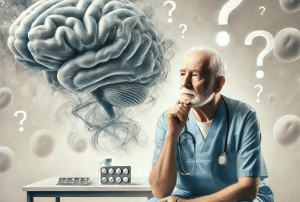Dementia is the overall term for a wide class of neurological disorders that progressively destroy synapses, affecting memory, thinking, and the ability to carry out everyday activities. Whereas most individuals think of dementia as a disease that causes people to lose their memory, the condition is actually much broader and may eventually lead to death. It is, therefore, crucial to observe precisely how the process of dementia occurs to cause an individual to die from the disease.
What is Dementia?
Before explaining how dementia causes death, it is essential to get an understanding of dementia. Dementia is not a disease but a term that describes a group of disorders affecting the brain, with Alzheimer’s disease being the most common form. Other forms of dementia include vascular dementia, Lewy body dementia, and frontotemporal dementia.
As the disease progresses, it causes the following:
- Memory Loss: Normally manifesting in the early stage, this is the first noticeable sign of dementia.
- Cognitive Decline: Difficulty in thinking, reasoning, and problem-solving.
- Behavioral Changes: Mood swings, depression, anxiety, social withdrawal.
- Physical Symptoms: Loss of motor skills, difficulty swallowing, coordination problems.
Each person with dementia will go through different experiences; however, these changes somehow follow a general progression through early, middle, and late stages.
The Final Stages of Dementia
The final stages of the disease are much more serious than problems with memory. Persons with advanced dementia will experience serious mental and physical impairments and will, eventually, die from their disease. A closer look at the final stages would include the following :
1. Severe Cognitive Decline
In the later stages of dementia, patients will have deep memory loss and struggle to identify loved ones around them, even closest family members. They may also fail to remember who they are themselves and lose the ability to understand or respond to their environment.
At a point where the body gradually loses the potential to think and interact with normal life, even the simplest thing cannot be achieved anymore. Affected individuals fall into a state of not communicating or being silent, isolating themselves and being depressed. Cognitive impairment progresses with general confusion, disorientation, and marked changes in behavior.
2. Loss of Mobility and Physical Function
The most important feature of late-stage dementia involves the inability to use one’s body. Patients cannot walk, may not have the ability to sit up, and may lose control over some basic movements of their body. The immobility therefore results in a higher incidence of infections, especially pneumonia, as patients enter into being bedridden.
The patient will often lose the ability to control bowel and bladder functions and may need assistance with all aspects of daily living, such as eating, drinking, and hygiene. Paralysis can lead to painful pressure ulcers, which may become infected and further deteriorate the patient’s health.
3. Difficulty Swallowing (Dysphagia)
Dysphagia, the inability to safely swallow food and liquid, is a common symptom that develops as many types of dementia progress. Dysphagia may lead to the risk of choking and development of aspiration pneumonia due to food or liquid unintentionally entering the lungs.
Malnutrition and dehydration also characterize late stages of dementia because the patient may refuse or forget to eat and drink. Consequently, the body weakens a lot, making the person prone to infections, organ failure, and other complications that hasten the end of life.
4. Increased Vulnerability to Infections
Those in advanced stages of dementia are usually infected due to their immunity, which is already very weak. Aspiration pneumonia is the main cause of death among dementia patients due to entry of food or liquid into the lungs. In many of these patients, pneumonia develops rapidly and can cause respiratory failure when treatment is not given early enough.
Pressure sores, skin infections and UTIs are other common occurrences among bedridden patients. When the body may not be able to overcome such kinds of infections, they could become life threatening, especially for those patients that have an advanced dementia.
5. Weight Loss and Malnutrition
Weight loss characterizes the later stage of dementia. Difficulty swallowing, forgetting to eat, and a decline in the feeling of hunger combine to produce malnutrition. As nutrition becomes inadequate for the body’s needs, muscle mass decreases and the immune system weakens, placing the patient at greater risk for illness and other life-threatening conditions.
This sometimes involves decisions about feeding tubes or other such interventions that keep the person nutritionally stable. This, however, is a very personal decision based on the person’s desires and the severity of their condition.
How Does Dementia Cause Death?
Most of the time, dementia is not considered an exact cause of death. Individuals with dementia die due to complications associated with the disease. Such complications are due to the severe decline in cognition and physical aspects during the terminal phases.
- Pneumonia: Aspiration pneumonia represents the most common cause of death for patients with dementia. Difficulty in swallowing may allow food and liquid to enter the lungs, causing an infection of that tissue. Pneumonia rapidly progresses through the course of illness because weakened immunity already exists, commonly resulting in respiratory failure and death.
- Sepsis: Sepsis is a violent reaction of the body to an infection. At this stage, the most common source of infection is pneumonia, UTI, or bed sore, all of which enter the blood and thereby spread sepsis. If not treated in time, this could lead to organ failure and ultimately death.
- Dehydration and Malnutrition: These set in when the patient loses their ability to eat and drink. This weakens the body considerably, making recovery from infections or other types of sicknesses quite difficult. Dehydration and malnutrition can also cause the shutting down of body organs, which ultimately leads to death.
- Organ Failure: In the advanced stages of dementia, the body being weakened to such an extent, the functioning of the vital organs including the heart, kidneys, and liver becomes progressively difficult. The predominant outcome is that due to infection, malnutrition, or other complications arising in the body, these organs stop working, which may lead to death.
End-of-Life Care for Dementia Patients
In the terminal stages of dementia, the emphasis of care shifts from life prolongation to comfort and dignity: symptom control-e.g., pain, anxiety, and dyspnea-by means of either palliative or hospice care; emotional support for both the patient and family.
1. Managing Pain and Discomfort
It may end in excruciating pain and agony for the patients with advanced dementia, especially when infection and other complications start setting in. The alleviation of pain is actually a form of end-of-life care that involves drugs, which can be prescribed by healthcare professionals to stop the suffering.
2. Emotional and Psychological Support
Late-stage dementia brings immense emotional impact on patients and their families. Due to the loss of awareness of the surroundings, a patient might experience frightening, confused, and distressing times. The families need to grieve the decline of their loved one’s personality and abilities. Counseling, support groups, and spiritual care may bring a small sense of comfort in these difficult times.
3. Decisions About Life-Prolonging Measures
Often, painful decisions about aggressive treatments or life-sustaining measures, such as feeding tubes, antibiotics, and resuscitation efforts, are usually left up to the patient’s family to decide, based on the patient’s overall quality-of-life wishes previously expressed.
Preparing for the End
A family can be emotionally and practically prepared for what lies ahead by understanding the stages of dementia, and how it finally results in death. Preparation for what will take place at the end can hopefully navigate the crucial decisions on the dementia care and support a patient should receive, so that the last days of the patient are as peaceful and comfortable as possible.
Tips for Families and Caregivers:
- Communicate early: Discuss end-of-life preferences with the individual with dementia while he or she is still able to make decisions.
- Get support: Seek professional help from your doctor, the palliative care team, or a patient support group.
- Allow comfort and dignity to be the focus: It is care in the last stages of life that is oriented to the quality of life.
Conclusion
Dementia is a terrible disease; it affects not only the patient but also all of those around them. Eventually, with the decline of cognitive and physical abilities in the advanced stages of dementia, there will be complications such as infections, malnutrition, and organ failure that will take over and lead to death. Understanding how dementia progresses and where end-of-life care fits into that progression is for many families important for allowing a loved one to die comfortably and with dignity over the last few days.





